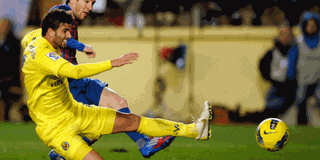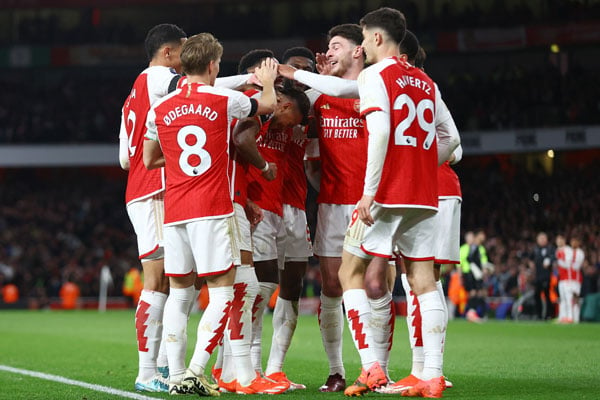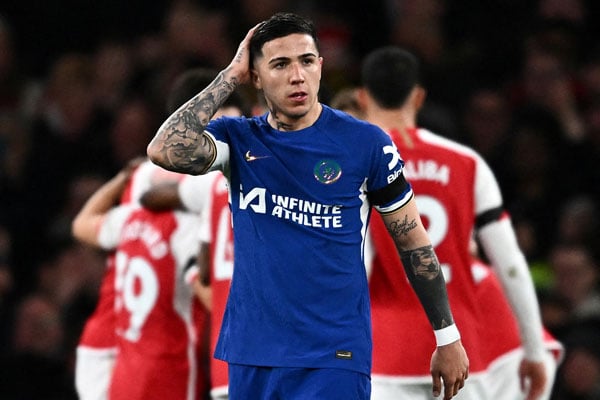Yellow Submarine in danger of becoming a memory in Spanish topflight football

Villarreal’s Argentinian defender Mateo Musacchio (L) vies for the ball with Barcelona’s Lionel Messi during their league game last weekend. Despite holding Barcelona to a goalless draw, Villareal are nolonger a force in Spanish football. PHOTO by AFP
Cause of their woes: Villarreal’s demise started in earnest the day coach Emmanuel Pellegrini was enticed by Florentino Perez’s second Galactico project. It was Pellegrini who masterminded success on a shoestring budget.
The unfortunate reality about history is that only winners are recalled vividly in sport.
There is no space for second best in the memory bank. That is how mankind was forever tuned.
Six years ago, FC Barcelona lifted the Champions League title in Paris. They won the final 2-1 after coming from a goal down. They beat Arsenal.
En route to the final, La Blaugrana saw off a spirited challenge from AC Milan. To get there, Arsenal outlasted Manuel Pellegrini’s Villarreal.
Technically, you could say Villarreal were Europe’s third or fourth best team. But for a Juan Roman Riquelme penalty miss, the Yellow Submarine could have featured in the final. It is possible that deep down in his mind, Frank Rijkaard, the Barcelona coach at the time, could have preferred facing Arsenal at Stade de France than a domestic rival in the club’s biggest match in 12 years.
So hypothetically, there was a distinct possibility that Villarreal, a club from a town with a population that can’t fill Camp Nou, could have lifted the biggest prize in European football. Enough of the dreaming. Fast-forward today, the club are sitting in 18th position with a measly 20 points from as many matches. By all accounts, the future is not looking rosy for a team that was once rated among the continent’s finest passing sides. The mother of ironies is that their best performance was reserved for the match against world football’s premier club Barcelona. In a show of consummate resilience, the Yellow Submarine gallantly frustrated the three-peat champions in La Liga last weekend. The 0-0 stalemate has all but drowned Barca’s hopes of winning a fourth successive league title, which would emulate Johan Cruyff’s ‘Dream Team’ achievement of the early 90s.
Villarreal’s demise started in earnest the day Pellegrini was enticed by Florentino Perez’s second Galactico project. It was Pellegrini who masterminded success on a shoestring budget.
His cunning ways in the market were best suited for them and Pellegrini enjoyed a tremendous working relationship with club chariman Fernando Roig.
The problem with a coach growing into an institution at a club is that succeding him comes with its travails – which partly explains why fans of Arsenal and Man Utd in England today can’t imagine an existence without Arsene Wenger and Sir Alex Ferguson. In Germany, Werder Bremen’s Thomas Schaaf is more than a foundation.
In Spain, longevity is uncommon. On Monday, Sporting Gijon let go of Manuel Preciado after six years. He was the ‘Fergie’ of La Liga having been the longest serving of the current coaches. Everton’s David Moyes would have a laugh if he read tributes to preciado’s endurance. Thus for the Yellow Submarine, the departure of Pellegrini, whose DNA had been woven in the club’s fabric, drilled a huge hole in Villarreal.
Replacements Ernesto Valverde and Juan Carlos Garrido have not lasted beyond a season and interim coach Jose Francisco Molina, who was promoted from the B team, now faces a fight to save the club from Segunda.
The club are entitled to legitimate excuses. Guiseppe Rossi’s injury last November effectively ended their hopes of any achievement this season. Injuries at varying times to players like Zapata, Cani, Senna and Nilmar have not helped either. Rossi’s importance to Villarreal is similar to Messi’s at Barca. This season, Villarreal more than ever needed a massive contribution from the diminutive Italian once Santi Crzorla was traded to moneybags Malaga last summer. If Molina can’t drag the team out of its quagmire, a drop to Segunda could well spell the end of the Yellow Submarine in the memory. Who remembers Deportivo Alaves?




